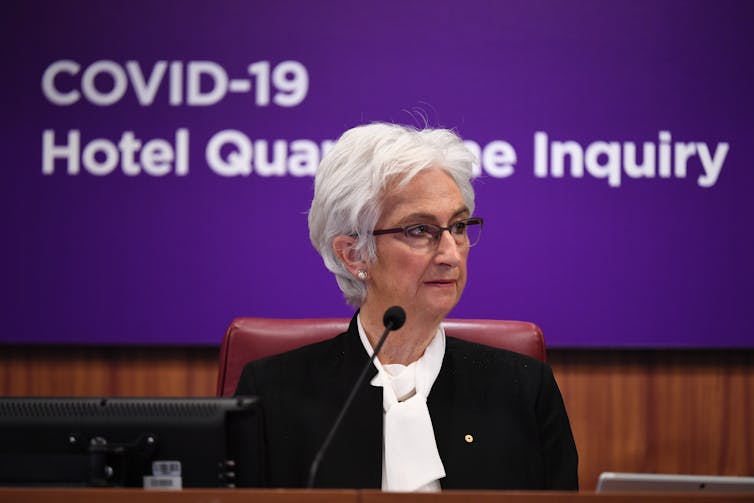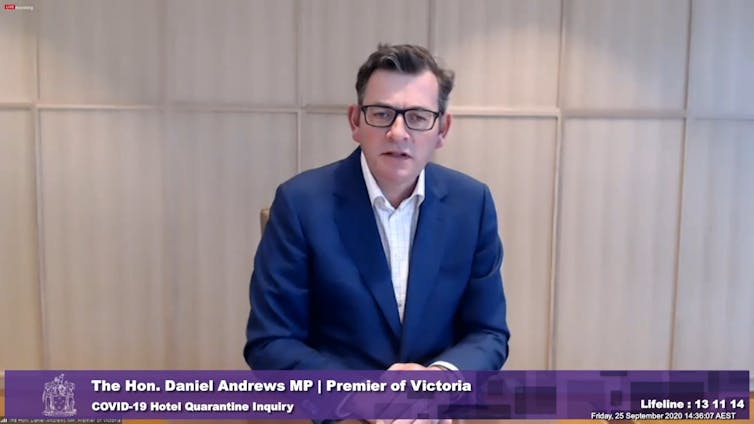A year after the Victoria hotel quarantine inquiry, one significant question remains unanswered
- Written by Kristen Rundle, Professor of Law, The University of Melbourne
This time last year, the nation was riveted by the Victorian COVID-19 Hotel Quarantine Inquiry[1], launched to determine the cause of the state’s disastrous second COVID wave. The outbreak led to 768 deaths and a 111-day lockdown of Melbourne.
It didn’t take long before a problem revealed itself. It was not at all clear who made the decision to “contract out” the hotel quarantine enforcement to private security providers, which is what led to the virus seeping into the community.
A long line of senior political and governmental officials denied any association with it. The inquiry’s chair, Jennifer Coate, came to describe the decision as an “orphan”.
 Jennifer Coate is seen during the COVID-19 Hotel Quarantine Inquiry in Melbourne last July.
James Ross/AAP
Jennifer Coate is seen during the COVID-19 Hotel Quarantine Inquiry in Melbourne last July.
James Ross/AAP
We did learn what went wrong[2] from an infection control standpoint and reset the hotel quarantine system to be safer. But now, the debate has shifted to whether we should have hotel quarantine at all.
The question the inquiry left behind is a different one, and it’s not only about Victoria. Why are governments across Australia so reliant on private contractors in the first place?
Read more: Victoria’s hotel quarantine overhaul is a step in the right direction, but issues remain[3]
Contracting out is standard practice
“Contracting out” government functions for delivery by the private sector has become the standard way of doing things across all levels of government in Australia.
Indeed, it has become so standard that decision-makers might not see the matter as involving choice at all. It’s just how things are done.
Elsewhere[4], I have said more about the disintegrating effects this situation can have on the principles of responsible government, around which Australia’s constitutional systems are built. The entrenched status of “contracting out” means the potential for more “orphan” decisions can occur at any time and place.
There’s a long story behind how governments across Australia, of all political stripes, have arrived at a place where everything from defence security to disability services (and much in between) is performed by private contractors.
 Nobody claimed responsibility for the decision to use private contractors in Victoria’s flawed hotel quarantine program.
COVID-19 HOTEL QUARANTINE INQUIRY
Nobody claimed responsibility for the decision to use private contractors in Victoria’s flawed hotel quarantine program.
COVID-19 HOTEL QUARANTINE INQUIRY
Yet, justifications for why outsourcing is used to perform the work of government still tend to be based more on assertions than arguments.
One of these assertions is that the private sector is more “efficient” than government. But the reality is outsourcing government service delivery doesn’t necessarily cost less. It just means less is spent on public employees.
But there’s more to it than contestable claims about efficiency. The functions government must perform and the services the private sector can provide are not necessarily the same thing.
For example, was the choice of outsourced “security services” for the hotel quarantine program led by a careful understanding of the nature of quarantine, or by what the private sector could deliver? Too little thought is given to what might get lost in translation.
Read more: Hotel quarantine interim report recommends changes but accountability questions remain[5]
Why nobody is looking at this issue
All of this requires a conversation about the appropriateness of “contracting out” in different contexts that we’ve basically never had. Outsourcing has rarely, if ever, been the subject of significant parliamentary debate in any Australian jurisdiction.
Indeed, sometimes the only way the public finds out about what’s going on with government contracting – in the many forms it might take – is through inquiries launched to investigate something that has gone wrong.
Ombudsmen and auditors-general can be empowered to look at particular instances of outsourcing and make recommendations in relation to them. We might occasionally also see a specific contract questioned in a Senate Estimates hearing.
But it’s important to highlight these “watchdogs” are not there to tell governments how to govern us. Opportunities to have that say are thin on the ground.
Read more: Melbourne's hotel quarantine bungle is disappointing but not surprising. It was overseen by a flawed security industry[6]
A good illustration of this is the 2019 Senate Legal and Constitutional Affairs Committee inquiry[7] into the impact of changes to models of government service delivery (including outsourcing). There was little in its terms of reference to suggest it sought views on whether we should be doing these things at all. The changes were going to happen, the inquiry was about their likely “impact”.
Perhaps we’ll also need an inquiry into the vaccine rollout to find out about the contractual arrangements there, given the Commonwealth Department of Health has argued multiple exemptions – including “national security” – in response to freedom of information requests about the agreements in place.
Once, there was an independent body called the Administrative Review Council that kept an eye on the “big picture” developments in government administration. Well ahead of the curve, it published a report[8] in 1998 on the possible implications of Australia’s fulsome embrace of “contracting out” for those directly affected by outsourced government service delivery.
The ARC pledged to revisit this question if there was ever a need. But it was effectively abolished before it could do so. It was a casualty of the 2015 “smaller government” reforms that dismantled multiple government agencies and radically reduced the size of the public service, leading to even more outsourcing to private contractors.
The ARC’s functions were consolidated into the attorney-general’s department, to the extent that they continue to be performed at all.
If the public wants a discussion about how governments govern us - that is not led by governments themselves - it is up to us to pursue it. The silver lining is we at least get to set the terms of the conversation.
While we work out those terms, it would be unwise to relegate the Victorian COVID-19 Hotel Quarantine Inquiry to history. There’s still a whole lot we can learn from it.
References
- ^ Victorian COVID-19 Hotel Quarantine Inquiry (www.quarantineinquiry.vic.gov.au)
- ^ learn what went wrong (theconversation.com)
- ^ Victoria’s hotel quarantine overhaul is a step in the right direction, but issues remain (theconversation.com)
- ^ Elsewhere (www.griffithreview.com)
- ^ Hotel quarantine interim report recommends changes but accountability questions remain (theconversation.com)
- ^ Melbourne's hotel quarantine bungle is disappointing but not surprising. It was overseen by a flawed security industry (theconversation.com)
- ^ 2019 Senate Legal and Constitutional Affairs Committee inquiry (www.aph.gov.au)
- ^ report (www.ag.gov.au)

















